复合宾语(三)
- 格式:doc
- 大小:53.50 KB
- 文档页数:13
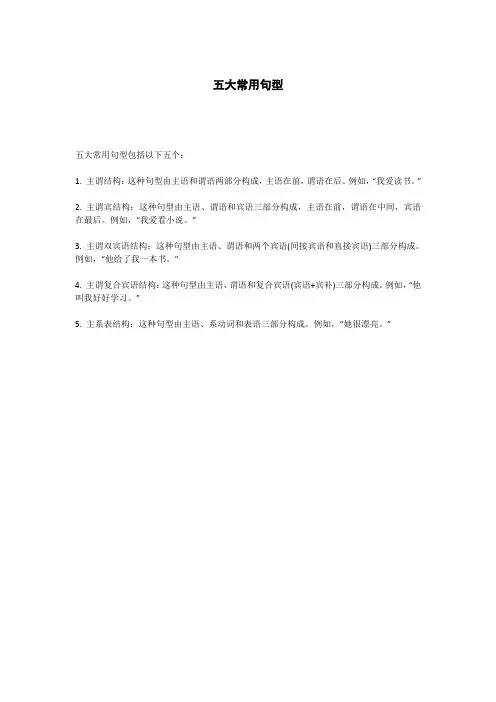
五大常用句型
五大常用句型包括以下五个:
1. 主谓结构:这种句型由主语和谓语两部分构成,主语在前,谓语在后。
例如,“我爱读书。
”
2. 主谓宾结构:这种句型由主语、谓语和宾语三部分构成,主语在前,谓语在中间,宾语在最后。
例如,“我爱看小说。
”
3. 主谓双宾语结构:这种句型由主语、谓语和两个宾语(间接宾语和直接宾语)三部分构成。
例如,“他给了我一本书。
”
4. 主谓复合宾语结构:这种句型由主语、谓语和复合宾语(宾语+宾补)三部分构成。
例如,“他叫我好好学习。
”
5. 主系表结构:这种句型由主语、系动词和表语三部分构成。
例如,“她很漂亮。
”。
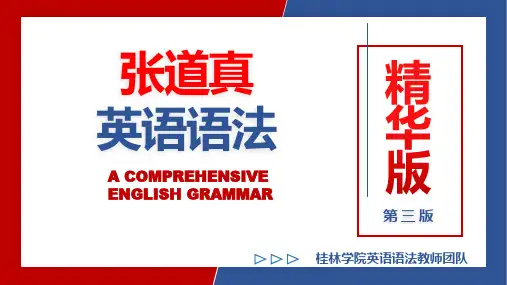
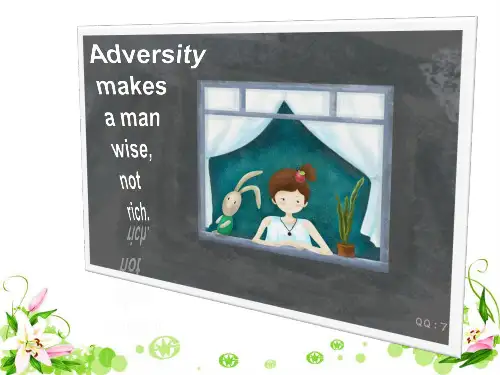
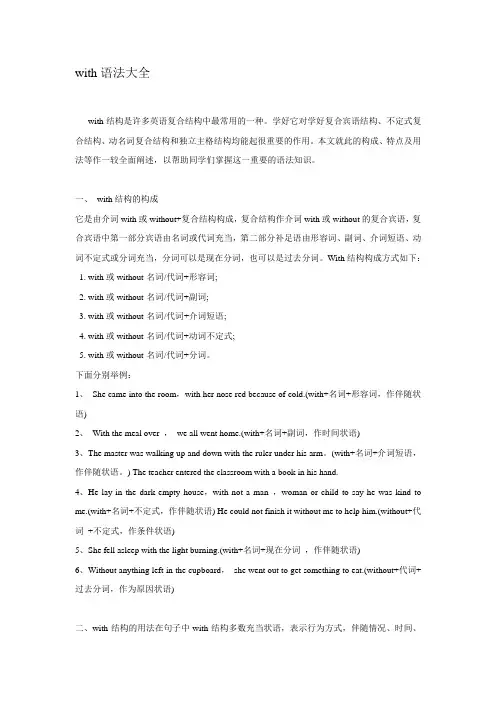
with语法大全with结构是许多英语复合结构中最常用的一种。
学好它对学好复合宾语结构、不定式复合结构、动名词复合结构和独立主格结构均能起很重要的作用。
本文就此的构成、特点及用法等作一较全面阐述,以帮助同学们掌握这一重要的语法知识。
一、with结构的构成它是由介词with或without+复合结构构成,复合结构作介词with或without的复合宾语,复合宾语中第一部分宾语由名词或代词充当,第二部分补足语由形容词、副词、介词短语、动词不定式或分词充当,分词可以是现在分词,也可以是过去分词。
With结构构成方式如下:1. with或without-名词/代词+形容词;2. with或without-名词/代词+副词;3. with或without-名词/代词+介词短语;4. with或without-名词/代词+动词不定式;5. with或without-名词/代词+分词。
下面分别举例:1、She came into the room,with her nose red because of cold.(with+名词+形容词,作伴随状语)2、With the meal over ,we all went home.(with+名词+副词,作时间状语)3、The master was walking up and down with the ruler under his arm。
(with+名词+介词短语,作伴随状语。
) The teacher entered the classroom with a book in his hand.4、He lay in the dark empty house,with not a man ,woman or child to say he was kind to me.(with+名词+不定式,作伴随状语) He could not finish it without me to help him.(without+代词+不定式,作条件状语)5、She fell asleep with the light burning.(with+名词+现在分词,作伴随状语)6、Without anything left in the cupboard,she went out to get something to eat.(without+代词+过去分词,作为原因状语)二、with结构的用法在句子中with结构多数充当状语,表示行为方式,伴随情况、时间、原因或条件(详见上述例句)。
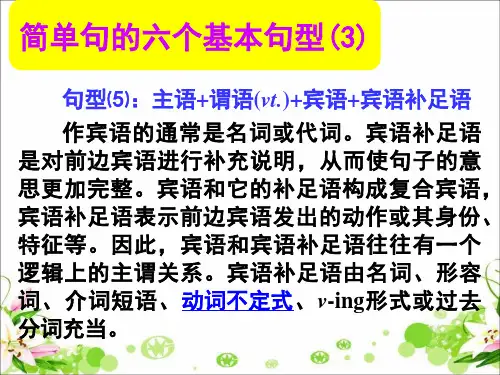
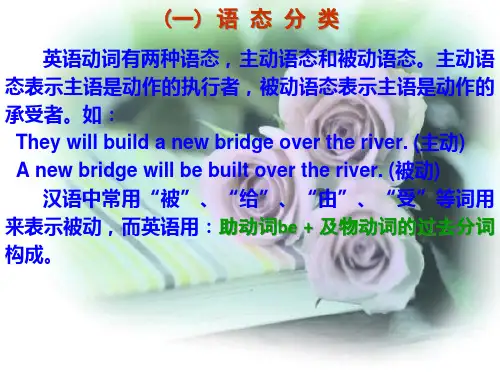
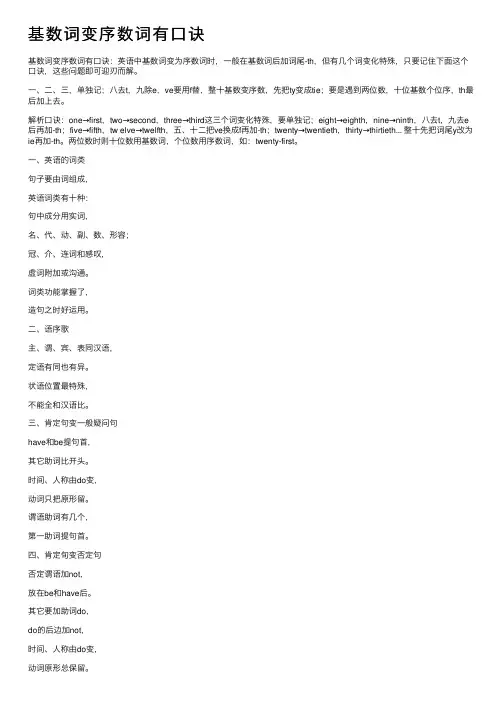
基数词变序数词有⼝诀基数词变序数词有⼝诀:英语中基数词变为序数词时,⼀般在基数词后加词尾-th,但有⼏个词变化特殊,只要记住下⾯这个⼝诀,这些问题即可迎刃⽽解。
⼀、⼆、三,单独记;⼋去t,九除e,ve要⽤f替,整⼗基数变序数,先把ty变成tie;要是遇到两位数,⼗位基数个位序,th最后加上去。
解析⼝诀:one→first,two→second,three→third这三个词变化特殊,要单独记;eight→eighth,nine→ninth,⼋去t,九去e 后再加-th;five→fifth,tw elve→twelfth,五、⼗⼆把ve换成f再加-th;twenty→twentieth,thirty→thirtieth... 整⼗先把词尾y改为ie再加-th。
两位数时则⼗位数⽤基数词,个位数⽤序数词,如:twenty-first。
⼀、英语的词类句⼦要由词组成,英语词类有⼗种:句中成分⽤实词,名、代、动、副、数、形容;冠、介、连词和感叹,虚词附加或沟通。
词类功能掌握了,造句之时好运⽤。
⼆、语序歌主、谓、宾、表同汉语,定语有同也有异。
状语位置最特殊,不能全和汉语⽐。
三、肯定句变⼀般疑问句have和be提句⾸,其它助词⽐开头。
时间、⼈称由do变,动词只把原形留。
谓语助词有⼏个,第⼀助词提句⾸。
四、肯定旬变否定句否定谓语加not,放在be和have后。
其它要加助词do,do的后边加not,谓语若是助词多,not紧跟第⼀个。
五、名词的所有格名词只变数,不分主宾格。
⼈和动物类,可变所有格。
撇(’)后加s,相当汉语“的”。
时间、距离等,也变所有格。
六、名词变复数单数变为复数式,加上“s”统⾔之。
下列结尾名词后,要加“s”先加“e”:发⾳[F][tF][s]和[z],或是辅⾳加“o”时。
有些名词变复数,词尾变化要注意:“y”前字母是辅⾳,⼀律变“y”为“ie”;遇到“f/fe”,有时需要变“ve”。
少数名词不规则,特别情况靠硬记。

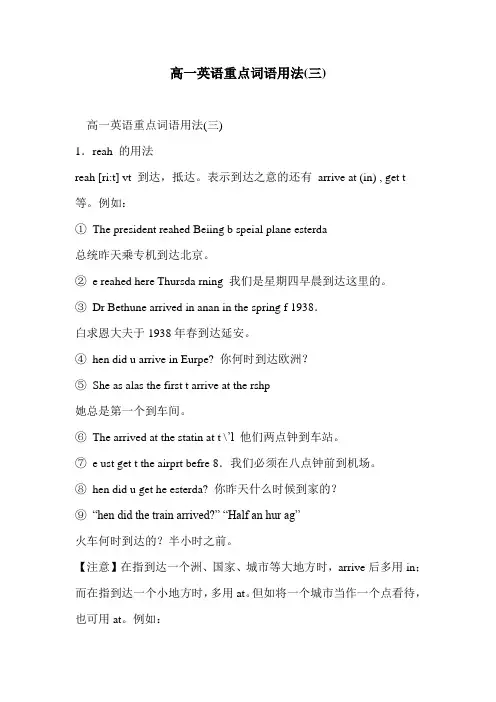
高一英语重点词语用法(三)高一英语重点词语用法(三)1.reah 的用法reah [ri:t] vt 到达,抵达。
表示到达之意的还有arrive at (in) , get t 等。
例如:①The president reahed Beiing b speial plane esterda总统昨天乘专机到达北京。
②e reahed here Thursda rning 我们是星期四早晨到达这里的。
③Dr Bethune arrived in anan in the spring f 1938.白求恩大夫于1938年春到达延安。
④hen did u arrive in Eurpe? 你何时到达欧洲?⑤She as alas the first t arrive at the rshp她总是第一个到车间。
⑥The arrived at the statin at t \’l 他们两点钟到车站。
⑦e ust get t the airprt befre 8.我们必须在八点钟前到机场。
⑧hen did u get he esterda? 你昨天什么时候到家的?⑨“hen did the train arrived?” “Half an hur ag”火车何时到达的?半小时之前。
【注意】在指到达一个洲、国家、城市等大地方时,arrive后多用in;而在指到达一个小地方时,多用at。
但如将一个城市当作一个点看待,也可用at。
例如:①ar arrived in Shanghai last nth 玛丽上月到达上海。
②e arrived at the sall village in the evening 我们傍晚到达那个小村庄。
③The train arrived at inan at ten \’ l 火车十点钟抵达济南站。
2.disver 的用法disver [dis\’)v+] vt发现(已存在但并不为人所知的事,通常指地方或科学事实);知道。
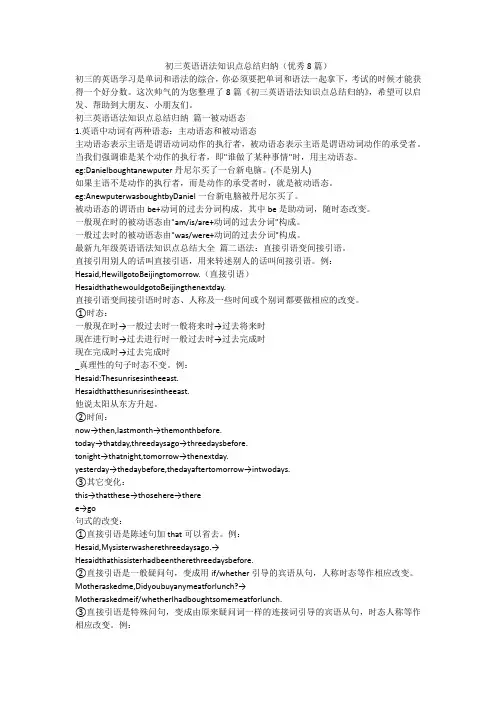
初三英语语法知识点总结归纳(优秀8篇)初三的英语学习是单词和语法的综合,你必须要把单词和语法一起拿下,考试的时候才能获得一个好分数。
这次帅气的为您整理了8篇《初三英语语法知识点总结归纳》,希望可以启发、帮助到大朋友、小朋友们。
初三英语语法知识点总结归纳篇一被动语态1.英语中动词有两种语态:主动语态和被动语态主动语态表示主语是谓语动词动作的执行者,被动语态表示主语是谓语动词动作的承受者。
当我们强调谁是某个动作的执行者,即"谁做了某种事情"时,用主动语态。
eg:Danielboughtanewputer丹尼尔买了一台新电脑。
(不是别人)如果主语不是动作的执行者,而是动作的承受者时,就是被动语态。
eg:AnewputerwasboughtbyDaniel一台新电脑被丹尼尔买了。
被动语态的谓语由be+动词的过去分词构成,其中be是助动词,随时态改变。
一般现在时的被动语态由"am/is/are+动词的过去分词"构成。
一般过去时的被动语态由"was/were+动词的过去分词"构成。
最新九年级英语语法知识点总结大全篇二语法:直接引语变间接引语。
直接引用别人的话叫直接引语,用来转述别人的话叫间接引语。
例:Hesaid,HewillgotoBeijingtomorrow.(直接引语)HesaidthathewouldgotoBeijingthenextday.直接引语变间接引语时时态、人称及一些时间或个别词都要做相应的改变。
①时态:一般现在时→一般过去时一般将来时→过去将来时现在进行时→过去进行时一般过去时→过去完成时现在完成时→过去完成时_真理性的句子时态不变。
例:Hesaid:Thesunrisesintheeast.Hesaidthatthesunrisesintheeast.他说太阳从东方升起。
②时间:now→then,lastmonth→themonthbefore.today→thatday,threedaysago→threedaysbefore.tonight→thatnight,tomorrow→thenextday.yesterday→thedaybefore,thedayaftertomorrow→intwodays.③其它变化:this→thatthese→thosehere→theree→go句式的改变:①直接引语是陈述句加that可以省去。
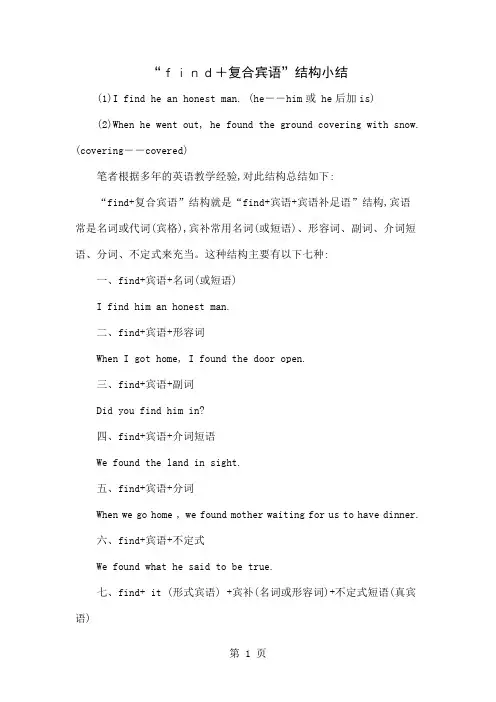
“find+复合宾语”结构小结(1)I find he an honest man. (he――him或 he后加is)(2)When he went out, he found the ground covering with snow. (covering――covered)笔者根据多年的英语教学经验,对此结构总结如下:“find+复合宾语”结构就是“find+宾语+宾语补足语”结构,宾语常是名词或代词(宾格),宾补常用名词(或短语)、形容词、副词、介词短语、分词、不定式来充当。
这种结构主要有以下七种:一、find+宾语+名词(或短语)I find him an honest man.二、find+宾语+形容词When I got home, I found the door open.三、find+宾语+副词Did you find him in?四、find+宾语+介词短语We found the land in sight.五、find+宾语+分词When we go home , we found mother waiting for us to have dinner.六、find+宾语+不定式We found what he said to be true.七、find+ it (形式宾语) +宾补(名词或形容词)+不定式短语(真宾语)I found it our duty to help you.注:以上七种句型都可以用“find + that宾语从句”进行转换。
如: 1.You will find it a difficult book.=You will find that it is a difficult book.2.We all found the film interesting.=We all found that the film was interesting.3.When we got there, we found the light already out.=When we got there, we found that the light was already out.4.She found nobody in the classroom.=She found that nobody was in the classroom.5.Mary found a wallet lying on the ground.=Mary found that a wallet was lying on the ground.6.We found him to be dead in the morning.=We found that he was dead in the morning.7.We find it necessary to learnt English well.=We find that it is necessary to learn English well.跟踪练习:汉译英。
宾语一般用在及物动词的后面,表示行为动词所涉及的对象。
一. 名词作宾语Show your passport, please. 请出示护照。
二. 代词作宾语She didn't say anything. 她什么也没说。
三. 数词作宾语How many do you want? - I want two. 你要几个?-我要两个。
四. 名词化的形容词作宾语They sent the injured to hospital. 他们把伤员送到医院。
五. 不定式或ing形式作宾语They asked to see my passport. 他们要求看我的护照。
I enjoy working with you. 我和你们一道工作很愉快。
六. 从句作宾语Did you write down what he said? 你把他的话记下了没有?编辑本段语法1) 宾语的格:Ich packe meine Buecher in die Mappe. (第四格,最常见)我把书装进书包。
Ich helfe meiner Mutter. (动词宾语第三格)我帮妈妈的忙。
Wem gehoert das Fahrrad. (动词宾语第三格)这车是谁的?Hol bitte ein Bier aus dem Kuehlschrank. (介词宾语第三格,常见)请从冰箱拿一瓶啤酒来。
Dieses Gesetz bedarf der Zustimmung des Bundesrats. (动词宾语第二格,极罕见)此法律须联邦议会同意。
Des Geldes wegen arbeitet sie noch immer. (介词宾语第二格,常见)为了钱,她还得工作。
2) 宾语的复合形式:Ich schenke meiner Freundin einen Mantel. (间接/第三格宾语 + 直接/第四格宾语)我送了我女友一件大衣。
二、句子成分由不同词类的单词,按照一定的语法规则组合在一起,能表达一个完整意思的语言单位叫做句子。
一个句子由各个功能不同的部分构成,这些部分叫做句子成分(membersofthesentence)。
英语的句子成分有八种:主语、谓语动词、表语、宾语、定语、状语、主语补足语和宾语补足语。
现分述如下:(一)主语主语(subject)是句子所要说明的人或事物,是句子的主体。
主语的位置通常在句首,一般不省略。
可以担当主语的有名词、代词、数词、动词不定式、动名词和主语从句。
例如:1)Wallshaveears.隔墙有耳。
(名词做主语)2)Hewilltakeyoutothehospital.他会带你去医院。
(代词做主语)3)Threeplusfourequalsseven.三加四等于七。
(数词做主语)4)Toseeistobelieve.眼见为实。
(动词不定式做主语)5)Smokingisnotallowedinpublicplaces.公共场所不允许吸烟。
(动名词做主语)6)Whetherornottheywillcomedependsontheweather.他们来不来取决与天气。
(从句做主语)(二)谓语动词谓语动词(predicateverb)是说明主语的动作或状态的句子成分。
谓语动词的位置一般在主语之后。
谓语动词由实义动词或系动词担任。
助动词或情态动词加其他动词的适当形式也可以构成谓语动词。
例如:1)Thechancemaynevercomeagain.这样的机会恐怕不会再来。
2)Tomwasverysickatheart.汤姆心里非常难过。
3)Maryhasbeenworkingatthedressshopsince1994.自1994年以来,玛丽一直在那家服装店工作。
(三)表语表语(predicative)是用来说明主语的身份、特征和状态的,它的位置在系动词之后。
可作表语的有名词、代词、形容词与分词、数词、动词不定式、介词短语、副词以及表语从句等。
句子的成分和基本句型一、句子的成分组成句子的各个部分叫做句子的成分。
句子成分包括:主语、谓语、表语、宾语(直接宾语、间接宾语)、宾语补足语、定语和状语。
1. 谓语必须用动词。
谓语和主语在人称和数两方面必须一致。
2. 主语是谓语讲述的对象,表示所说的“是什么”或“是谁”。
3. 宾语是动作、行为的对象。
4. 表语说明主语“是什么”或者“怎么样”它的位置在系动词后面。
am/is/are之后做表语。
5. 定语是用来修饰名词或代词的。
6. 状语用来修饰动词、形容词或副词。
一般表示行为发生的时间、地点、目的、方式、程度等意义,一般由副词、介词短语、不定式或相当于副词的词或短语来表示。
二、简单句的五种基本句型句子成分的表示法s: subject(主语)v:verb(动词)o: object(宾语)p:predicative(表语)第1种句型:主语+不及物动词:s+v谓语是不及物动词时,本身能表达完整的意思,后面不需要宾语。
第2种句型:主语+及物动词+宾语:s+v+o谓语是及物动词时,不能表达完整的意思,必须跟一个宾语,即动作的承受者,才能使意思完整。
第3种句型:主语+系动词+表语:s+v+p谓语是系动词时,不能表达完整的意思,必须加上一个表示主语的特征,身份,状态的表语。
常见的系动词:第4种句型:主语+及物动词+间接宾语+直接宾语如何区分直接宾语和间接宾语?常带双宾语的动词:第5种句型:主语+及物动词+宾语+宾语补足语=s+v(及物)+o+oc第4种句型和第5种句型(双宾语和复合宾语)的比较(1) he gave me a book.(双宾语)他给我一本书。
(2) he calls me tom.(复合宾语)他叫我汤姆。
例(2)中的宾语me(我),和宾语补足语tom(汤姆),可以成为逻辑上的主谓关系,即“我是汤姆”。
但例(1)则不可以,不能想像为“我是一本书”,所以双宾语没有逻辑上的主谓关系。
凭这一点,我们就可以很容易的区分开它们了。
北京学位英语试题:语法分析(三)第五节非谓语动词非谓语动词分三种,即:不定式,动名词和分词。
下面分三部分进行介绍。
动词不定式动词不定式有两种,一种是带to的不定式,一种是不带to的不定式。
不带to的不定式和动词原形相同,但在大多数情况下不定式都是带to的。
不定式可以在句中作谓语,主语,宾语,复合宾语,定语,状语以及表语等成分。
基本形式:主动形式被动形式一般式(not) to make (not) to be made完成式(not) to have made (not)to have been made进行式(not) to be making一、动词不定式的基本结构和用法动词不定式是一种非谓语动词形式,由不定式符号to加动词原形构成。
例:To talk to him is to talk to the wall. 和他讲话是对牛弹琴。
往年试题:例(1)Good-bye , Mr. Wang. I’m pleased _____ you.A. to meet B .meeting C. to have been meeting D. to be met答案:A(1998年57题)例(2)Encouragement through praise is the most effective method of getting people _____ their best.A. doB. to doC. doingD. done答案:B(1996年44题)二、动词不定式的被动式当不定式的逻辑主语是不定式所表示的对象时(或动作的承受者时),不定式一般要用被动式。
往年试题:例(1). The question ______ at the meeting tomorrow is very important.A. to discussB. being discussedC. to be discussedD. will be discussed答案:C(2004年11月34题)例(2)We shall ask for samples _____ and then we can make our decision.A. to be sentB. being sentC. to sentD. to have been sent答案:A(2003年4月17题)例(3)The ability _____ is very important for any speaker.A. to hear clearlyB. to be clearly heardC. to hearing clearlyD. to being clearly heard答案:B(1999年39题)例(4)Mr. and Mrs. Smith didn’t expect the house _____ so well.A. to be decoratedB. to decorateC. be decoratedD. decorating答案:A(1995年22题)三、动词不定式的完成式表示不定式的动作发生在句子谓语所表示的动作之前。
第一讲学会划分句子成分,为理清句式奠基句子不清、理解不明,一见长难句就发懵,皆因句子成分没划清。
划分句子成分、拆分长难句是正确理解、应用复杂句式的必备手段,所以在学习句式之前,先给同学们补上欠缺的这一课。
句子有若干个组成部分,分别承担着不同的作用,这些组成部分叫作句子成分。
英语中的句子成分分为主语(Subject)、谓语(Predicate)、宾语(Object)、表语(Predicative)、定语(Attribute)、状语(Adverbial)、补语(Complement)和同位语(Appositive)。
一、主语——习惯于发号施令,偶尔也会被赶下台在句子中,主语是谓语所表示动作或状态的执行者。
主语一般位于句子开头,且不能省略。
但在某些特定的句式里,如:疑问句、倒装句、祈使句、感叹句等,句子主语也可以“下台”而位于谓语动词之后或省略。
能够充当主语的主要有名词(短语)、主格代词、数词、动名词(短语)、动词不定式(短语)和从句等。
当主语为从句时,为避免头重脚轻,可用it作形式主语。
The patient's family have expressed their gratitude to the press in letters for the money raised.(名词作主语)Studying English is very important.(动名词短语作主语)It's obvious that he was wrong.(代词it充当形式主语,that引导的主语从句作真正的主语)二、谓语——坚决服从主语“领导”,执行命令雷厉风行谓语用来描述主语的行为动作、状态或具有的特征,常位于主语之后。
谓语可由动词和动词短语、系表结构以及“助动词/情态动词+实义动词”充当,有时态、语态和语气的变化,同时又受到主语人称和数的制约。
判断的依据是看主语和动词之间的关系,如果两者之间是主动关系就用主动语态,如果是被动关系就用被动语态。
复合宾语“主语+vt.+宾语+宾语补足语”是英语中的一个基本句型。
宾语和它的补足语有逻辑上的主谓关系。
下面介绍几个典型动词后面宾语补足语的形式:1.Make+复合宾语:补足语有四+1种形式,即:n.;do(不带to的不定式);adj.;-ed;句子。
Eg:We made him monitor of our class.The teacher made us write a composition.I saw him come in.I saw him coming in.He was seen to come in by me.The teacher’s explanation made the text easier to understand. The teacher’s explanation made it easier to understand the text.His English is so poor that he can’t make himself understood. The speaker raised his voice to make himself heard.He introduced himself to make himself known.His parents managed to make him examined in the hospital.“Once people think you are a liar,it's hard for you to make yourself believed,no matter what you'll say.” father warned his son.The shop owner will make the ordered TV sets delivered to the customers today.I need to make my car repaired.我需要修理我的车。
At the party, the pretty girl wore a very attractive skirt to make herself noticed.-ed 修饰人的词We will soon make our city what your city is now.2.Find+复合宾语: 补足语有八种形式即:-ing; -ed; (to be)+n./adj.; adv.; prep. phraseDick found himself walking in the direction of Mike’s.When she came to herself, she found herself lying in hospital.He found the door closed.I found myself surrounded by a group of boys.I find the students (to be) happy and cheerful.The old man was found dead in the forest.When she came to herself she found herself in hospital.(class school college university hospital prison bed church table desk earth sea…此乃有无冠词里的一个点)You will find it(to be) a difficult book.She was found alone in the room.He hurried there, but found them all out.3.Keep+复合宾语en:补足语有五种形式:adj.; adv.; prep.;-ing; -ed.I kept myself warm by walking up and down.我踱来踱去以暖和身子。
He closed the window to keep the cold out.Don’t keep your friend waiting outside.How do you think you can keep yourself motivated learning English?你认为在学习英语时你怎样可以保持积极性?Michael put up a picture of Yao Ming beside the bed to keep himself reminded of his own dreams.Television has many advantages. It keeps us informed about thelatest news and also provides entertainment in the home.He kept the dog in the room.4.leave+复合宾语有七种形式:adj.; adv.; n.; prep. Phrase; -ing; -ed. to doDon’t leave the door open.They left the light on.His parents died and left the boy an orphan.His illness left him in hospital/at home.They left the work half done.(undone unfinished untouched unsettled)Don’t leave him waiting outside.He left the lawyer to deal with his will after his death.He left, leaving me to do all the rest work.We hurriedly ended our meeting, leaving many problems to be settled.(不可接双宾语的词有: hope explain suggest introduce present mention)Even the most ordinary objects can present to us powerfulimages.prove vt. I'll prove to the world that he was right.The theory that/which/ \ he stuck to proves to us that the eruption of a volcano can be forecast.一.不可接复合宾语的词有:hope suggest agree二.能接复合宾语的词:trouble :trouble sb. to do sth. :麻烦某人做某事depend on sb. to do sth. 依靠某人干You can’t depend on him to come here on time. 你不能指望他准时来这儿。
其它接复合宾语的词:1. Catch动词v. 撞见某人做某事;发觉,不期而遇find a person in some action; discover; surprise· I caught him smoking a cigarette.我碰上他抽烟。
·I caught the boy at it again.我又撞上这孩子在干这事。
·They were often caught in such activities.人们常常撞上他们搞这种活动。
1. The government officer spoke slowly enough to make his speec heasy .A.followB.to followC.followedD.followingfancy:可接“(to be/as)+ n./adj./prep.-phrase ”充当补足语的复合宾语(to be/as可省略)。
“with +复合宾语”结构既可用作定语,也可用作状语。
常见的“with +复合宾语”结构主要有以下七种形式:1)with +宾语+动词-ing形式With the boy leading the way, we had no trouble in getting to the station.由这个男孩带路,我们不难到达了火车站。
With the wind blowing heavily, we took great trouble to move on to the front.由于风刮得很大,我们费力地往前线进发。
2)with +宾语+过去分词(past participle)The child was crying with the glasses broken.眼镜破了,那小孩哭了起来。
With all the work finished, they hurried back home for lunch.所有的工作都做完了,他们匆忙回家吃午饭。
3)with +宾语+不定式With a lot of work to do, we had to be busy working day and night.有这么多的工作要做,我们只得日夜忙碌。
With many things to deal with, I have to stop listening to the light music.有许多事要处理,我只好停止收听轻音乐。
4)with +宾语+介词短语The teacher entered the classroom with a book in his hand./book in hand.老师手中拿着一本书走进教室。
She saw a small river with green grass and red flowers on both sides.她看到一条小河,两岸长满了红花绿草。
5)with +宾语+形容词Don't sleep with the door and windows open.不要开着门窗睡觉。
6)with +宾语+副词Tian An Men Square looks even more beautiful with all lights on.所有的灯都亮着,天安门广场显得更加漂亮。